ICT710: Cambridge Analytica Case Analysis and Ethical Implications
VerifiedAdded on 2023/01/19
|14
|3406
|84
Report
AI Summary
This report analyzes the Cambridge Analytica scandal, which involved the unethical acquisition and manipulation of data from millions of Facebook users. The report provides an executive summary, followed by an introduction and background of the study, detailing the events and the context of the data breach. It then analyzes the case using the "Doing Ethics Technique" to identify the facts, issues, affected parties, ethical implications, and potential solutions. The Australian Computer Society (ACS) code of conduct is applied to evaluate the situation, and recommendations are provided. The report examines how Cambridge Analytica used behavioral science and big data to create tailored political messages, categorized voters, and extrapolated profiles, raising serious concerns about data privacy, informed consent, and the potential for manipulation. The analysis considers the ethical implications for Cambridge Analytica, American citizens, and politicians, and offers options for addressing the issues, including amending privacy policies and ceasing data collection from commercial sources. The report concludes with a summary of the case and provides recommendations for ethical conduct in the use of data and technology.
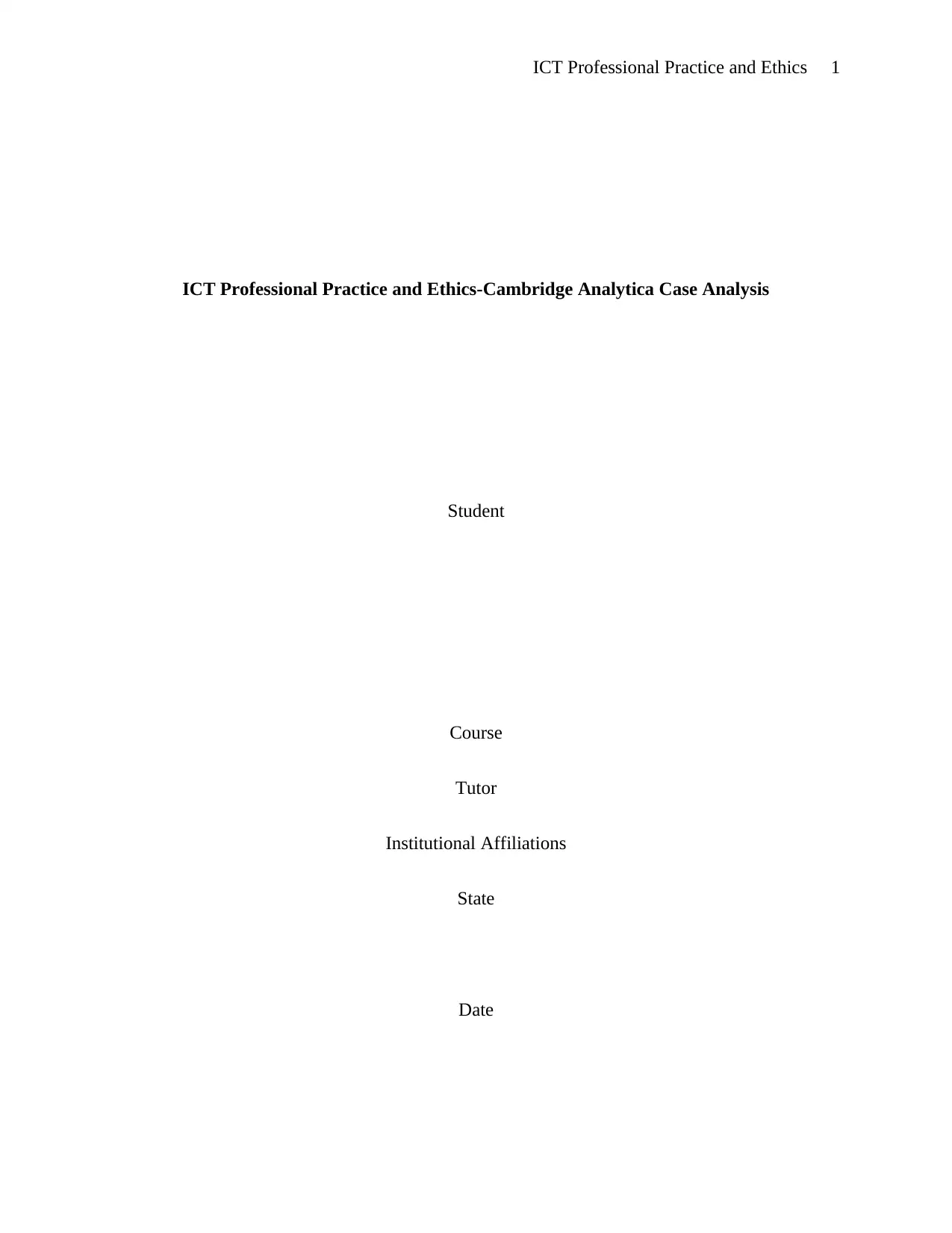
ICT Professional Practice and Ethics 1
ICT Professional Practice and Ethics-Cambridge Analytica Case Analysis
Student
Course
Tutor
Institutional Affiliations
State
Date
ICT Professional Practice and Ethics-Cambridge Analytica Case Analysis
Student
Course
Tutor
Institutional Affiliations
State
Date
Paraphrase This Document
Need a fresh take? Get an instant paraphrase of this document with our AI Paraphraser
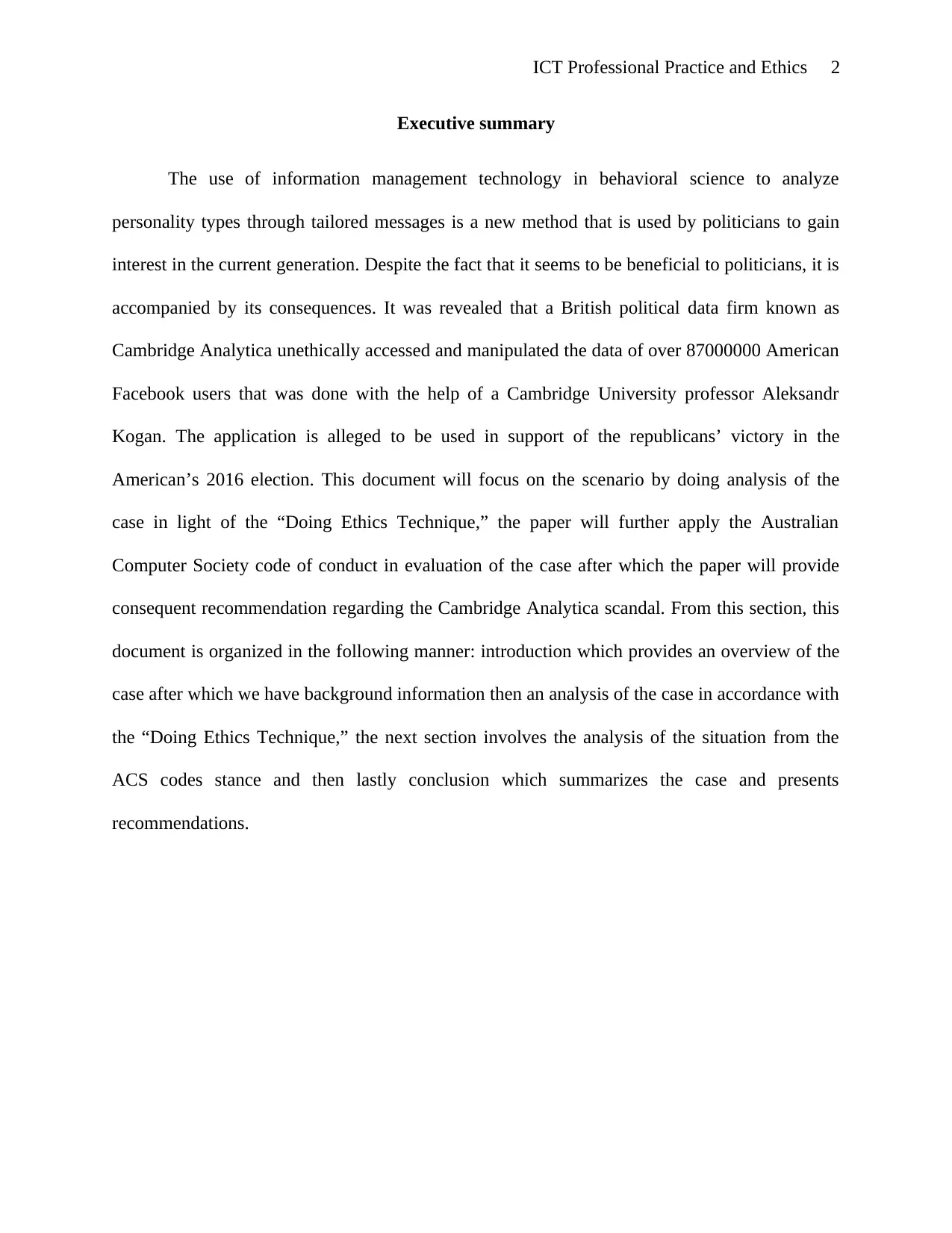
ICT Professional Practice and Ethics 2
Executive summary
The use of information management technology in behavioral science to analyze
personality types through tailored messages is a new method that is used by politicians to gain
interest in the current generation. Despite the fact that it seems to be beneficial to politicians, it is
accompanied by its consequences. It was revealed that a British political data firm known as
Cambridge Analytica unethically accessed and manipulated the data of over 87000000 American
Facebook users that was done with the help of a Cambridge University professor Aleksandr
Kogan. The application is alleged to be used in support of the republicans’ victory in the
American’s 2016 election. This document will focus on the scenario by doing analysis of the
case in light of the “Doing Ethics Technique,” the paper will further apply the Australian
Computer Society code of conduct in evaluation of the case after which the paper will provide
consequent recommendation regarding the Cambridge Analytica scandal. From this section, this
document is organized in the following manner: introduction which provides an overview of the
case after which we have background information then an analysis of the case in accordance with
the “Doing Ethics Technique,” the next section involves the analysis of the situation from the
ACS codes stance and then lastly conclusion which summarizes the case and presents
recommendations.
Executive summary
The use of information management technology in behavioral science to analyze
personality types through tailored messages is a new method that is used by politicians to gain
interest in the current generation. Despite the fact that it seems to be beneficial to politicians, it is
accompanied by its consequences. It was revealed that a British political data firm known as
Cambridge Analytica unethically accessed and manipulated the data of over 87000000 American
Facebook users that was done with the help of a Cambridge University professor Aleksandr
Kogan. The application is alleged to be used in support of the republicans’ victory in the
American’s 2016 election. This document will focus on the scenario by doing analysis of the
case in light of the “Doing Ethics Technique,” the paper will further apply the Australian
Computer Society code of conduct in evaluation of the case after which the paper will provide
consequent recommendation regarding the Cambridge Analytica scandal. From this section, this
document is organized in the following manner: introduction which provides an overview of the
case after which we have background information then an analysis of the case in accordance with
the “Doing Ethics Technique,” the next section involves the analysis of the situation from the
ACS codes stance and then lastly conclusion which summarizes the case and presents
recommendations.
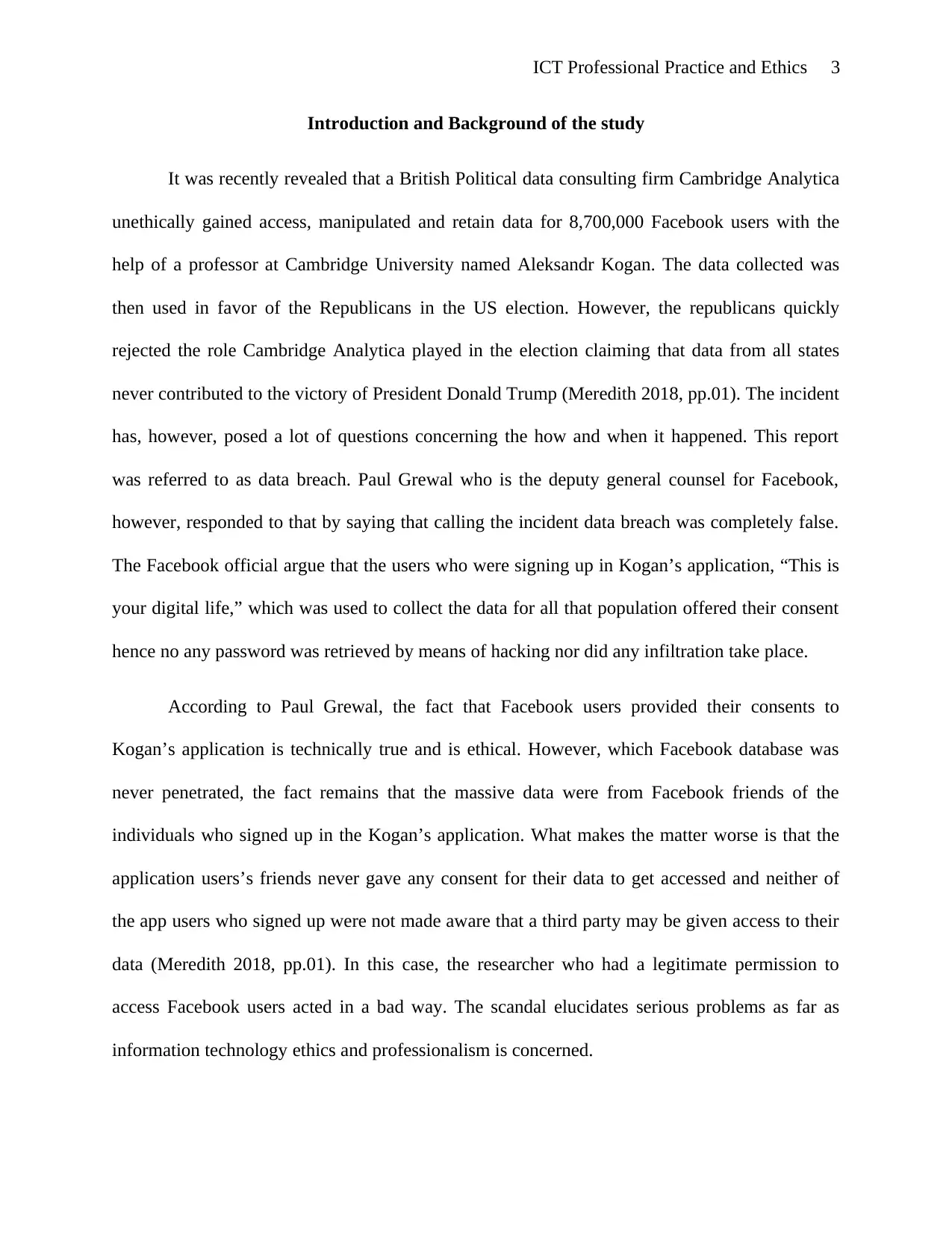
ICT Professional Practice and Ethics 3
Introduction and Background of the study
It was recently revealed that a British Political data consulting firm Cambridge Analytica
unethically gained access, manipulated and retain data for 8,700,000 Facebook users with the
help of a professor at Cambridge University named Aleksandr Kogan. The data collected was
then used in favor of the Republicans in the US election. However, the republicans quickly
rejected the role Cambridge Analytica played in the election claiming that data from all states
never contributed to the victory of President Donald Trump (Meredith 2018, pp.01). The incident
has, however, posed a lot of questions concerning the how and when it happened. This report
was referred to as data breach. Paul Grewal who is the deputy general counsel for Facebook,
however, responded to that by saying that calling the incident data breach was completely false.
The Facebook official argue that the users who were signing up in Kogan’s application, “This is
your digital life,” which was used to collect the data for all that population offered their consent
hence no any password was retrieved by means of hacking nor did any infiltration take place.
According to Paul Grewal, the fact that Facebook users provided their consents to
Kogan’s application is technically true and is ethical. However, which Facebook database was
never penetrated, the fact remains that the massive data were from Facebook friends of the
individuals who signed up in the Kogan’s application. What makes the matter worse is that the
application users’s friends never gave any consent for their data to get accessed and neither of
the app users who signed up were not made aware that a third party may be given access to their
data (Meredith 2018, pp.01). In this case, the researcher who had a legitimate permission to
access Facebook users acted in a bad way. The scandal elucidates serious problems as far as
information technology ethics and professionalism is concerned.
Introduction and Background of the study
It was recently revealed that a British Political data consulting firm Cambridge Analytica
unethically gained access, manipulated and retain data for 8,700,000 Facebook users with the
help of a professor at Cambridge University named Aleksandr Kogan. The data collected was
then used in favor of the Republicans in the US election. However, the republicans quickly
rejected the role Cambridge Analytica played in the election claiming that data from all states
never contributed to the victory of President Donald Trump (Meredith 2018, pp.01). The incident
has, however, posed a lot of questions concerning the how and when it happened. This report
was referred to as data breach. Paul Grewal who is the deputy general counsel for Facebook,
however, responded to that by saying that calling the incident data breach was completely false.
The Facebook official argue that the users who were signing up in Kogan’s application, “This is
your digital life,” which was used to collect the data for all that population offered their consent
hence no any password was retrieved by means of hacking nor did any infiltration take place.
According to Paul Grewal, the fact that Facebook users provided their consents to
Kogan’s application is technically true and is ethical. However, which Facebook database was
never penetrated, the fact remains that the massive data were from Facebook friends of the
individuals who signed up in the Kogan’s application. What makes the matter worse is that the
application users’s friends never gave any consent for their data to get accessed and neither of
the app users who signed up were not made aware that a third party may be given access to their
data (Meredith 2018, pp.01). In this case, the researcher who had a legitimate permission to
access Facebook users acted in a bad way. The scandal elucidates serious problems as far as
information technology ethics and professionalism is concerned.
⊘ This is a preview!⊘
Do you want full access?
Subscribe today to unlock all pages.

Trusted by 1+ million students worldwide
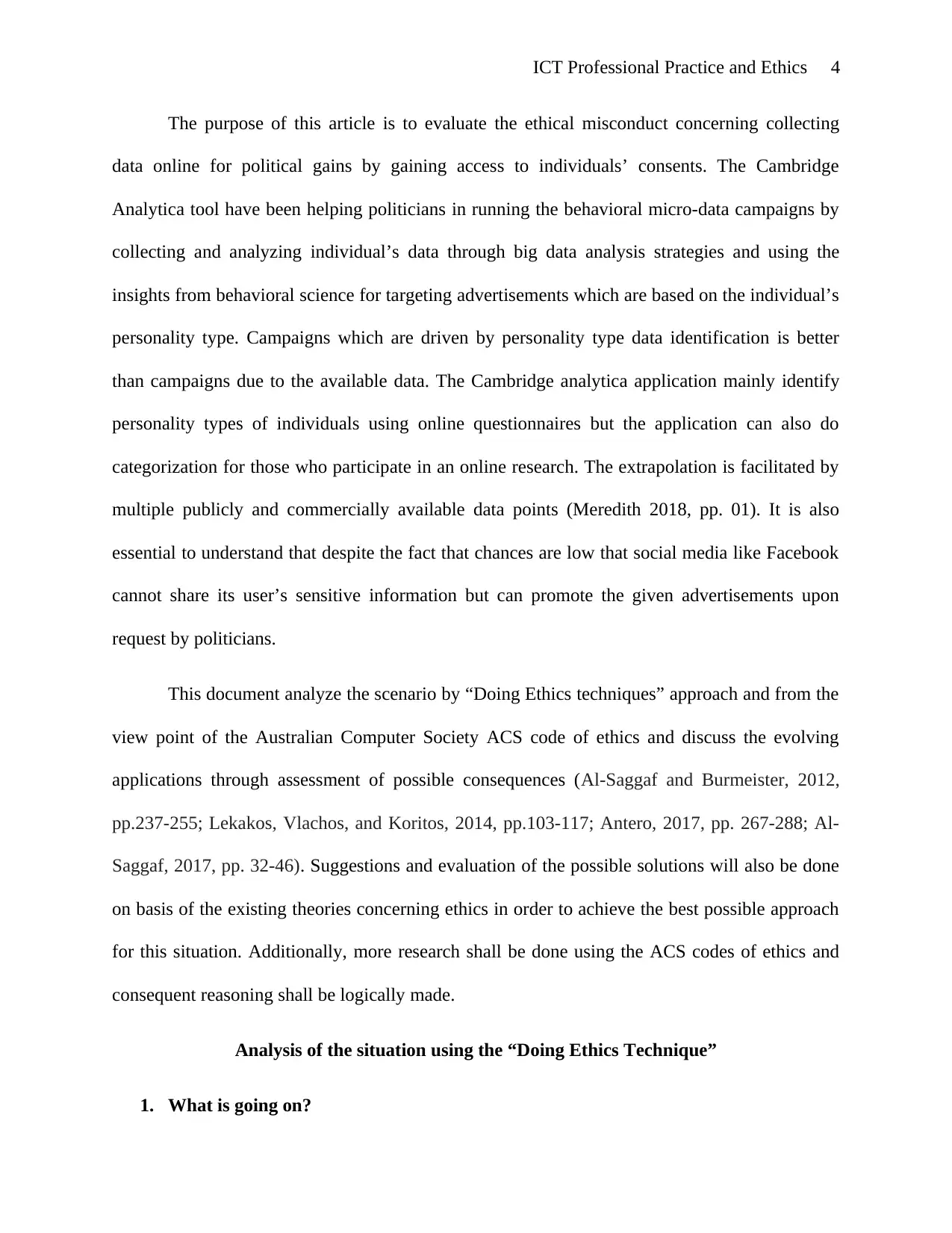
ICT Professional Practice and Ethics 4
The purpose of this article is to evaluate the ethical misconduct concerning collecting
data online for political gains by gaining access to individuals’ consents. The Cambridge
Analytica tool have been helping politicians in running the behavioral micro-data campaigns by
collecting and analyzing individual’s data through big data analysis strategies and using the
insights from behavioral science for targeting advertisements which are based on the individual’s
personality type. Campaigns which are driven by personality type data identification is better
than campaigns due to the available data. The Cambridge analytica application mainly identify
personality types of individuals using online questionnaires but the application can also do
categorization for those who participate in an online research. The extrapolation is facilitated by
multiple publicly and commercially available data points (Meredith 2018, pp. 01). It is also
essential to understand that despite the fact that chances are low that social media like Facebook
cannot share its user’s sensitive information but can promote the given advertisements upon
request by politicians.
This document analyze the scenario by “Doing Ethics techniques” approach and from the
view point of the Australian Computer Society ACS code of ethics and discuss the evolving
applications through assessment of possible consequences (Al-Saggaf and Burmeister, 2012,
pp.237-255; Lekakos, Vlachos, and Koritos, 2014, pp.103-117; Antero, 2017, pp. 267-288; Al-
Saggaf, 2017, pp. 32-46). Suggestions and evaluation of the possible solutions will also be done
on basis of the existing theories concerning ethics in order to achieve the best possible approach
for this situation. Additionally, more research shall be done using the ACS codes of ethics and
consequent reasoning shall be logically made.
Analysis of the situation using the “Doing Ethics Technique”
1. What is going on?
The purpose of this article is to evaluate the ethical misconduct concerning collecting
data online for political gains by gaining access to individuals’ consents. The Cambridge
Analytica tool have been helping politicians in running the behavioral micro-data campaigns by
collecting and analyzing individual’s data through big data analysis strategies and using the
insights from behavioral science for targeting advertisements which are based on the individual’s
personality type. Campaigns which are driven by personality type data identification is better
than campaigns due to the available data. The Cambridge analytica application mainly identify
personality types of individuals using online questionnaires but the application can also do
categorization for those who participate in an online research. The extrapolation is facilitated by
multiple publicly and commercially available data points (Meredith 2018, pp. 01). It is also
essential to understand that despite the fact that chances are low that social media like Facebook
cannot share its user’s sensitive information but can promote the given advertisements upon
request by politicians.
This document analyze the scenario by “Doing Ethics techniques” approach and from the
view point of the Australian Computer Society ACS code of ethics and discuss the evolving
applications through assessment of possible consequences (Al-Saggaf and Burmeister, 2012,
pp.237-255; Lekakos, Vlachos, and Koritos, 2014, pp.103-117; Antero, 2017, pp. 267-288; Al-
Saggaf, 2017, pp. 32-46). Suggestions and evaluation of the possible solutions will also be done
on basis of the existing theories concerning ethics in order to achieve the best possible approach
for this situation. Additionally, more research shall be done using the ACS codes of ethics and
consequent reasoning shall be logically made.
Analysis of the situation using the “Doing Ethics Technique”
1. What is going on?
Paraphrase This Document
Need a fresh take? Get an instant paraphrase of this document with our AI Paraphraser
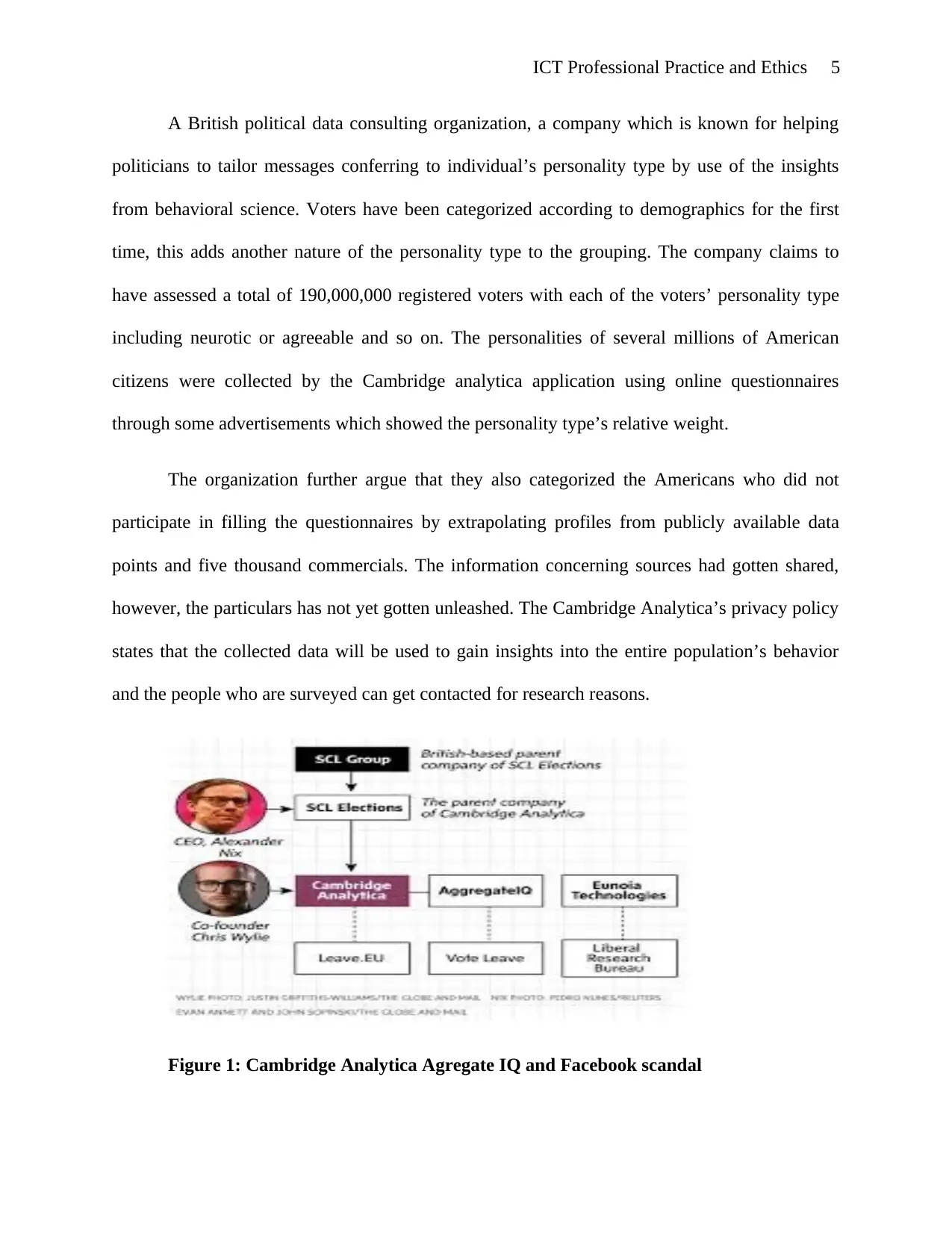
ICT Professional Practice and Ethics 5
A British political data consulting organization, a company which is known for helping
politicians to tailor messages conferring to individual’s personality type by use of the insights
from behavioral science. Voters have been categorized according to demographics for the first
time, this adds another nature of the personality type to the grouping. The company claims to
have assessed a total of 190,000,000 registered voters with each of the voters’ personality type
including neurotic or agreeable and so on. The personalities of several millions of American
citizens were collected by the Cambridge analytica application using online questionnaires
through some advertisements which showed the personality type’s relative weight.
The organization further argue that they also categorized the Americans who did not
participate in filling the questionnaires by extrapolating profiles from publicly available data
points and five thousand commercials. The information concerning sources had gotten shared,
however, the particulars has not yet gotten unleashed. The Cambridge Analytica’s privacy policy
states that the collected data will be used to gain insights into the entire population’s behavior
and the people who are surveyed can get contacted for research reasons.
Figure 1: Cambridge Analytica Agregate IQ and Facebook scandal
A British political data consulting organization, a company which is known for helping
politicians to tailor messages conferring to individual’s personality type by use of the insights
from behavioral science. Voters have been categorized according to demographics for the first
time, this adds another nature of the personality type to the grouping. The company claims to
have assessed a total of 190,000,000 registered voters with each of the voters’ personality type
including neurotic or agreeable and so on. The personalities of several millions of American
citizens were collected by the Cambridge analytica application using online questionnaires
through some advertisements which showed the personality type’s relative weight.
The organization further argue that they also categorized the Americans who did not
participate in filling the questionnaires by extrapolating profiles from publicly available data
points and five thousand commercials. The information concerning sources had gotten shared,
however, the particulars has not yet gotten unleashed. The Cambridge Analytica’s privacy policy
states that the collected data will be used to gain insights into the entire population’s behavior
and the people who are surveyed can get contacted for research reasons.
Figure 1: Cambridge Analytica Agregate IQ and Facebook scandal
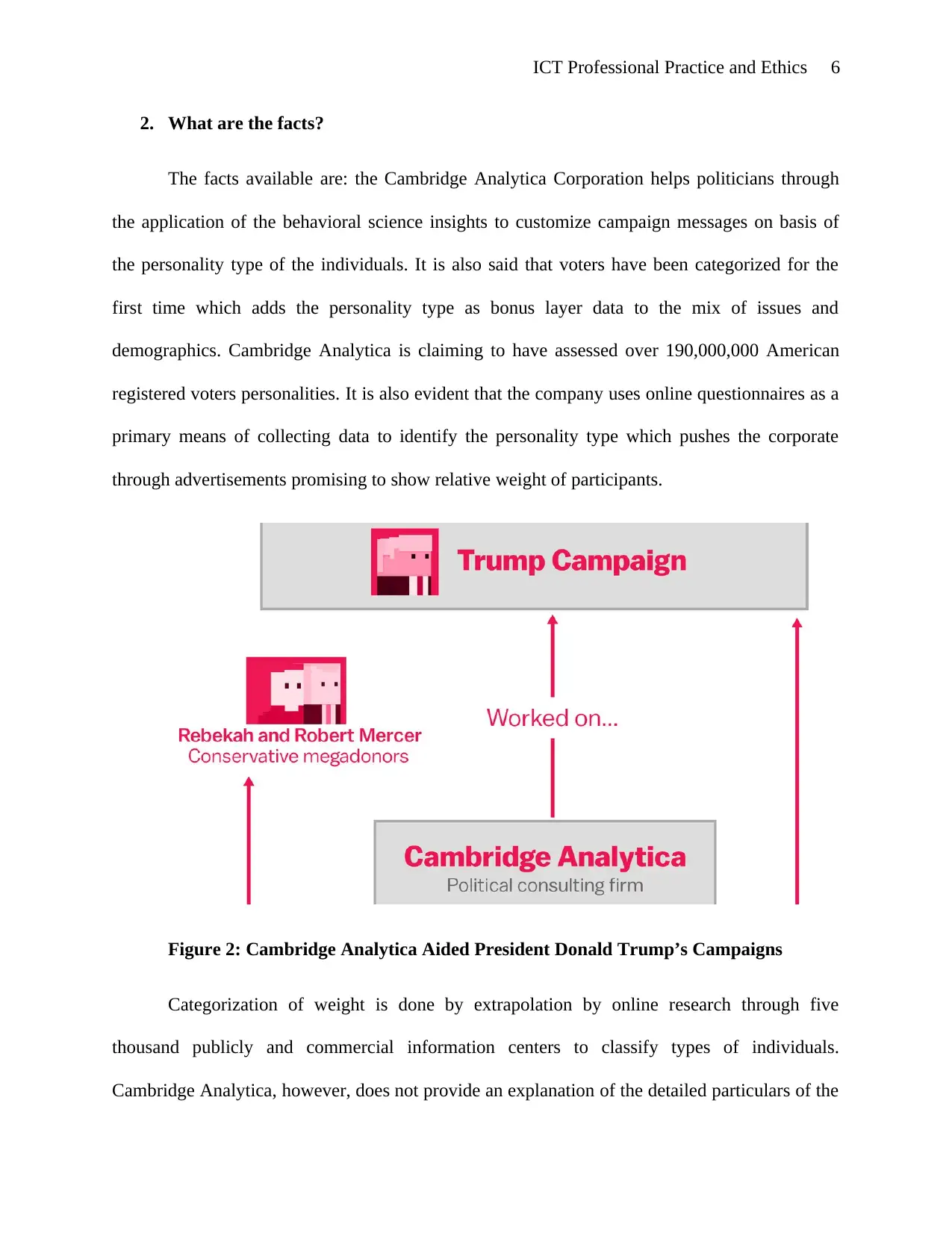
ICT Professional Practice and Ethics 6
2. What are the facts?
The facts available are: the Cambridge Analytica Corporation helps politicians through
the application of the behavioral science insights to customize campaign messages on basis of
the personality type of the individuals. It is also said that voters have been categorized for the
first time which adds the personality type as bonus layer data to the mix of issues and
demographics. Cambridge Analytica is claiming to have assessed over 190,000,000 American
registered voters personalities. It is also evident that the company uses online questionnaires as a
primary means of collecting data to identify the personality type which pushes the corporate
through advertisements promising to show relative weight of participants.
Figure 2: Cambridge Analytica Aided President Donald Trump’s Campaigns
Categorization of weight is done by extrapolation by online research through five
thousand publicly and commercial information centers to classify types of individuals.
Cambridge Analytica, however, does not provide an explanation of the detailed particulars of the
2. What are the facts?
The facts available are: the Cambridge Analytica Corporation helps politicians through
the application of the behavioral science insights to customize campaign messages on basis of
the personality type of the individuals. It is also said that voters have been categorized for the
first time which adds the personality type as bonus layer data to the mix of issues and
demographics. Cambridge Analytica is claiming to have assessed over 190,000,000 American
registered voters personalities. It is also evident that the company uses online questionnaires as a
primary means of collecting data to identify the personality type which pushes the corporate
through advertisements promising to show relative weight of participants.
Figure 2: Cambridge Analytica Aided President Donald Trump’s Campaigns
Categorization of weight is done by extrapolation by online research through five
thousand publicly and commercial information centers to classify types of individuals.
Cambridge Analytica, however, does not provide an explanation of the detailed particulars of the
⊘ This is a preview!⊘
Do you want full access?
Subscribe today to unlock all pages.

Trusted by 1+ million students worldwide
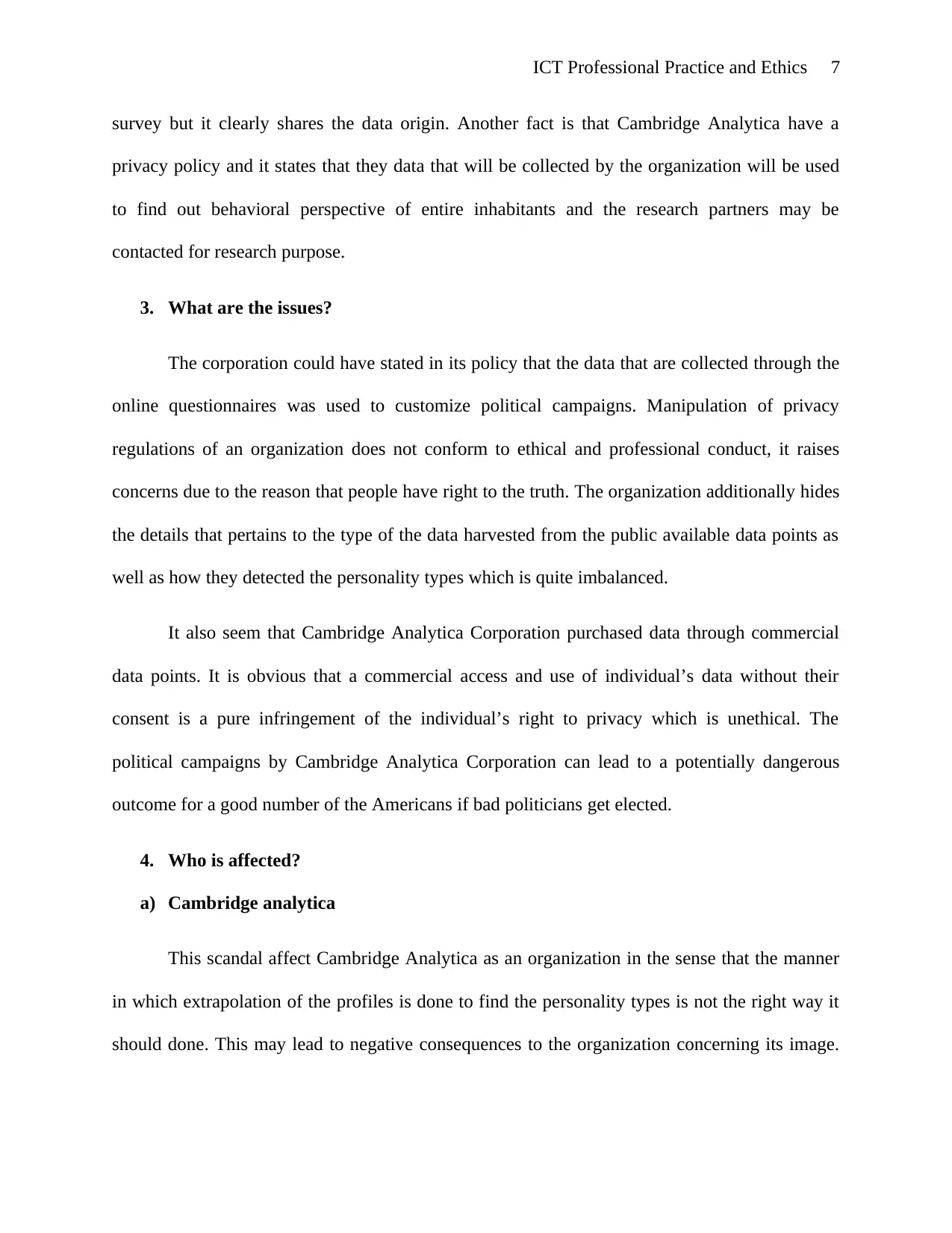
ICT Professional Practice and Ethics 7
survey but it clearly shares the data origin. Another fact is that Cambridge Analytica have a
privacy policy and it states that they data that will be collected by the organization will be used
to find out behavioral perspective of entire inhabitants and the research partners may be
contacted for research purpose.
3. What are the issues?
The corporation could have stated in its policy that the data that are collected through the
online questionnaires was used to customize political campaigns. Manipulation of privacy
regulations of an organization does not conform to ethical and professional conduct, it raises
concerns due to the reason that people have right to the truth. The organization additionally hides
the details that pertains to the type of the data harvested from the public available data points as
well as how they detected the personality types which is quite imbalanced.
It also seem that Cambridge Analytica Corporation purchased data through commercial
data points. It is obvious that a commercial access and use of individual’s data without their
consent is a pure infringement of the individual’s right to privacy which is unethical. The
political campaigns by Cambridge Analytica Corporation can lead to a potentially dangerous
outcome for a good number of the Americans if bad politicians get elected.
4. Who is affected?
a) Cambridge analytica
This scandal affect Cambridge Analytica as an organization in the sense that the manner
in which extrapolation of the profiles is done to find the personality types is not the right way it
should done. This may lead to negative consequences to the organization concerning its image.
survey but it clearly shares the data origin. Another fact is that Cambridge Analytica have a
privacy policy and it states that they data that will be collected by the organization will be used
to find out behavioral perspective of entire inhabitants and the research partners may be
contacted for research purpose.
3. What are the issues?
The corporation could have stated in its policy that the data that are collected through the
online questionnaires was used to customize political campaigns. Manipulation of privacy
regulations of an organization does not conform to ethical and professional conduct, it raises
concerns due to the reason that people have right to the truth. The organization additionally hides
the details that pertains to the type of the data harvested from the public available data points as
well as how they detected the personality types which is quite imbalanced.
It also seem that Cambridge Analytica Corporation purchased data through commercial
data points. It is obvious that a commercial access and use of individual’s data without their
consent is a pure infringement of the individual’s right to privacy which is unethical. The
political campaigns by Cambridge Analytica Corporation can lead to a potentially dangerous
outcome for a good number of the Americans if bad politicians get elected.
4. Who is affected?
a) Cambridge analytica
This scandal affect Cambridge Analytica as an organization in the sense that the manner
in which extrapolation of the profiles is done to find the personality types is not the right way it
should done. This may lead to negative consequences to the organization concerning its image.
Paraphrase This Document
Need a fresh take? Get an instant paraphrase of this document with our AI Paraphraser
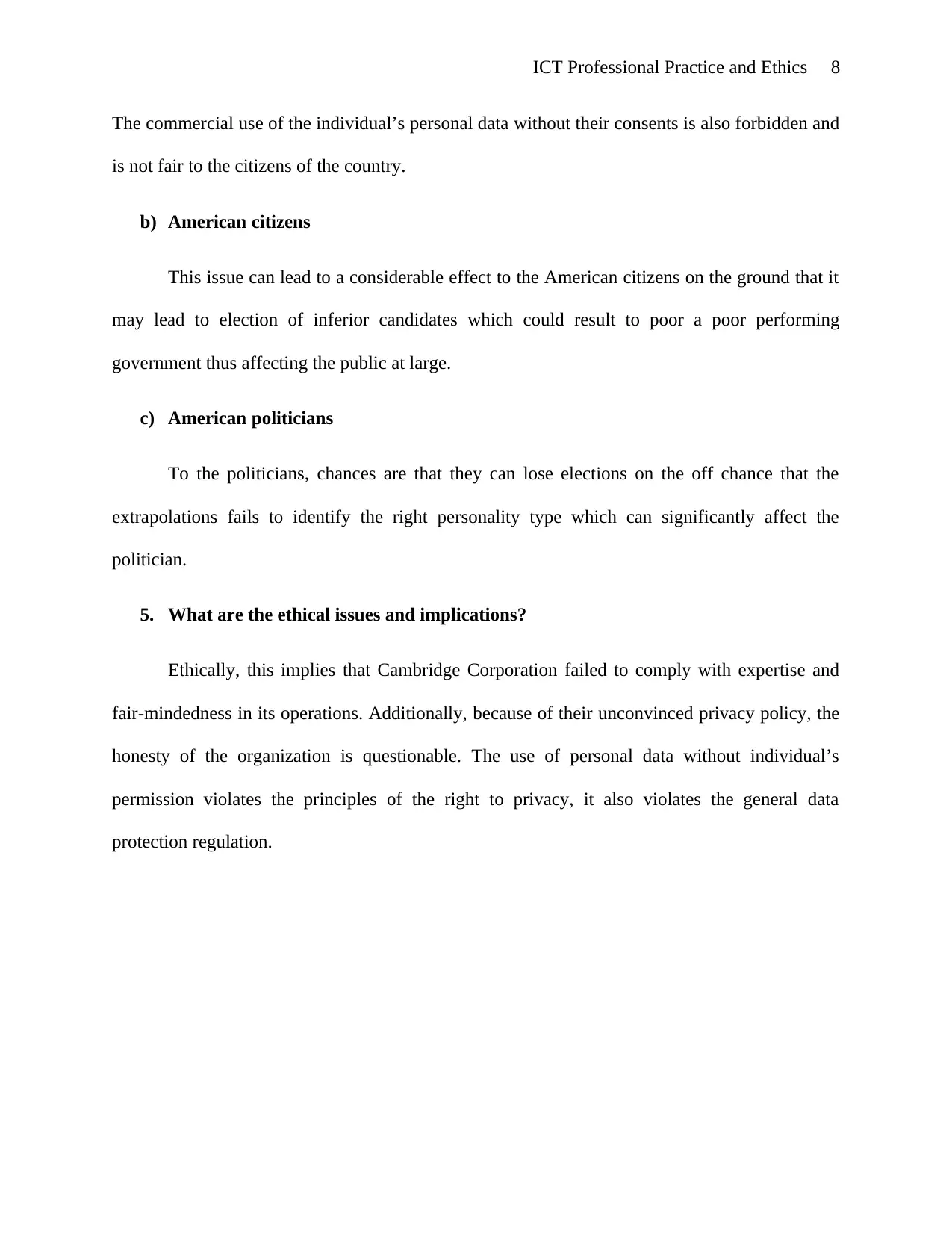
ICT Professional Practice and Ethics 8
The commercial use of the individual’s personal data without their consents is also forbidden and
is not fair to the citizens of the country.
b) American citizens
This issue can lead to a considerable effect to the American citizens on the ground that it
may lead to election of inferior candidates which could result to poor a poor performing
government thus affecting the public at large.
c) American politicians
To the politicians, chances are that they can lose elections on the off chance that the
extrapolations fails to identify the right personality type which can significantly affect the
politician.
5. What are the ethical issues and implications?
Ethically, this implies that Cambridge Corporation failed to comply with expertise and
fair-mindedness in its operations. Additionally, because of their unconvinced privacy policy, the
honesty of the organization is questionable. The use of personal data without individual’s
permission violates the principles of the right to privacy, it also violates the general data
protection regulation.
The commercial use of the individual’s personal data without their consents is also forbidden and
is not fair to the citizens of the country.
b) American citizens
This issue can lead to a considerable effect to the American citizens on the ground that it
may lead to election of inferior candidates which could result to poor a poor performing
government thus affecting the public at large.
c) American politicians
To the politicians, chances are that they can lose elections on the off chance that the
extrapolations fails to identify the right personality type which can significantly affect the
politician.
5. What are the ethical issues and implications?
Ethically, this implies that Cambridge Corporation failed to comply with expertise and
fair-mindedness in its operations. Additionally, because of their unconvinced privacy policy, the
honesty of the organization is questionable. The use of personal data without individual’s
permission violates the principles of the right to privacy, it also violates the general data
protection regulation.
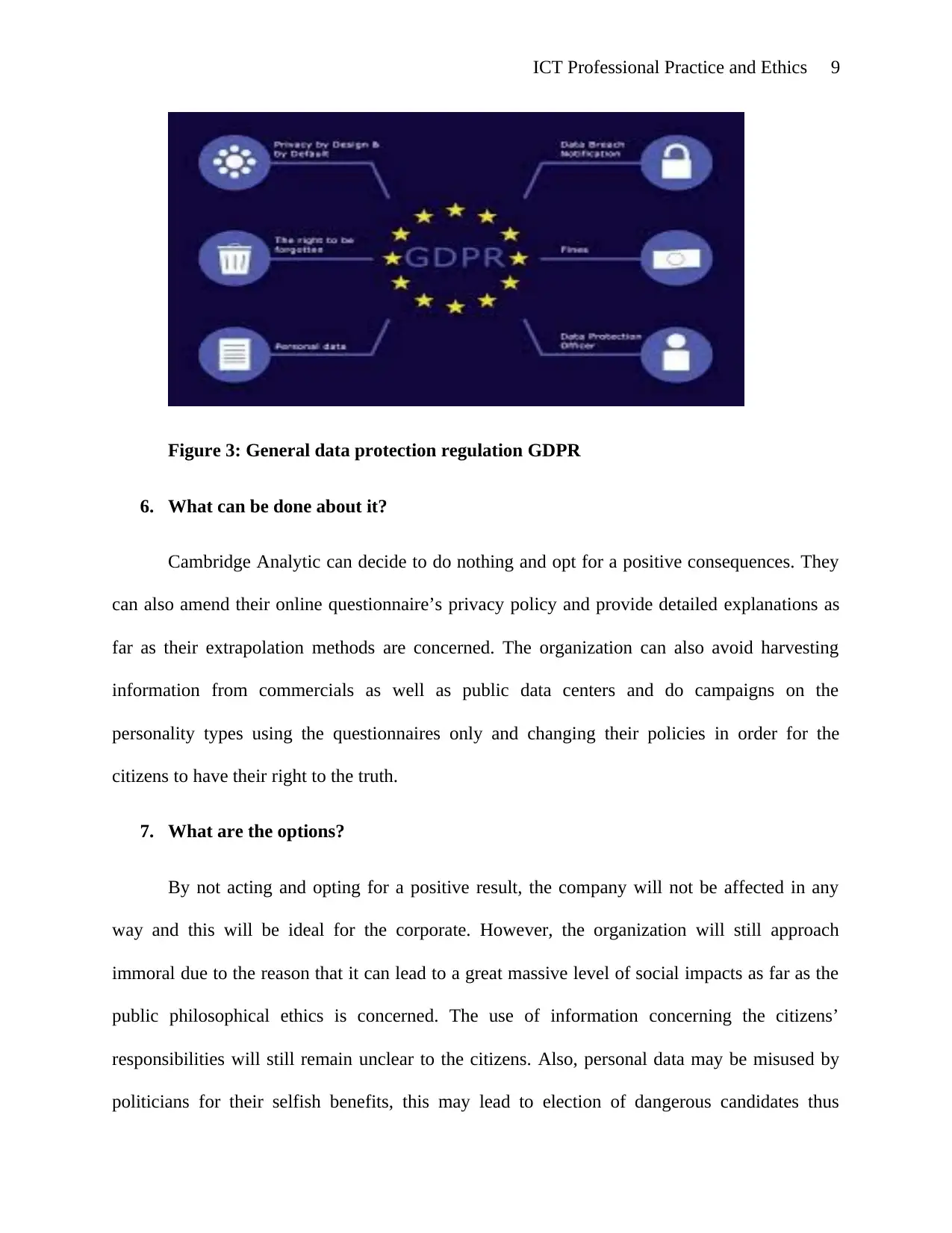
ICT Professional Practice and Ethics 9
Figure 3: General data protection regulation GDPR
6. What can be done about it?
Cambridge Analytic can decide to do nothing and opt for a positive consequences. They
can also amend their online questionnaire’s privacy policy and provide detailed explanations as
far as their extrapolation methods are concerned. The organization can also avoid harvesting
information from commercials as well as public data centers and do campaigns on the
personality types using the questionnaires only and changing their policies in order for the
citizens to have their right to the truth.
7. What are the options?
By not acting and opting for a positive result, the company will not be affected in any
way and this will be ideal for the corporate. However, the organization will still approach
immoral due to the reason that it can lead to a great massive level of social impacts as far as the
public philosophical ethics is concerned. The use of information concerning the citizens’
responsibilities will still remain unclear to the citizens. Also, personal data may be misused by
politicians for their selfish benefits, this may lead to election of dangerous candidates thus
Figure 3: General data protection regulation GDPR
6. What can be done about it?
Cambridge Analytic can decide to do nothing and opt for a positive consequences. They
can also amend their online questionnaire’s privacy policy and provide detailed explanations as
far as their extrapolation methods are concerned. The organization can also avoid harvesting
information from commercials as well as public data centers and do campaigns on the
personality types using the questionnaires only and changing their policies in order for the
citizens to have their right to the truth.
7. What are the options?
By not acting and opting for a positive result, the company will not be affected in any
way and this will be ideal for the corporate. However, the organization will still approach
immoral due to the reason that it can lead to a great massive level of social impacts as far as the
public philosophical ethics is concerned. The use of information concerning the citizens’
responsibilities will still remain unclear to the citizens. Also, personal data may be misused by
politicians for their selfish benefits, this may lead to election of dangerous candidates thus
⊘ This is a preview!⊘
Do you want full access?
Subscribe today to unlock all pages.

Trusted by 1+ million students worldwide
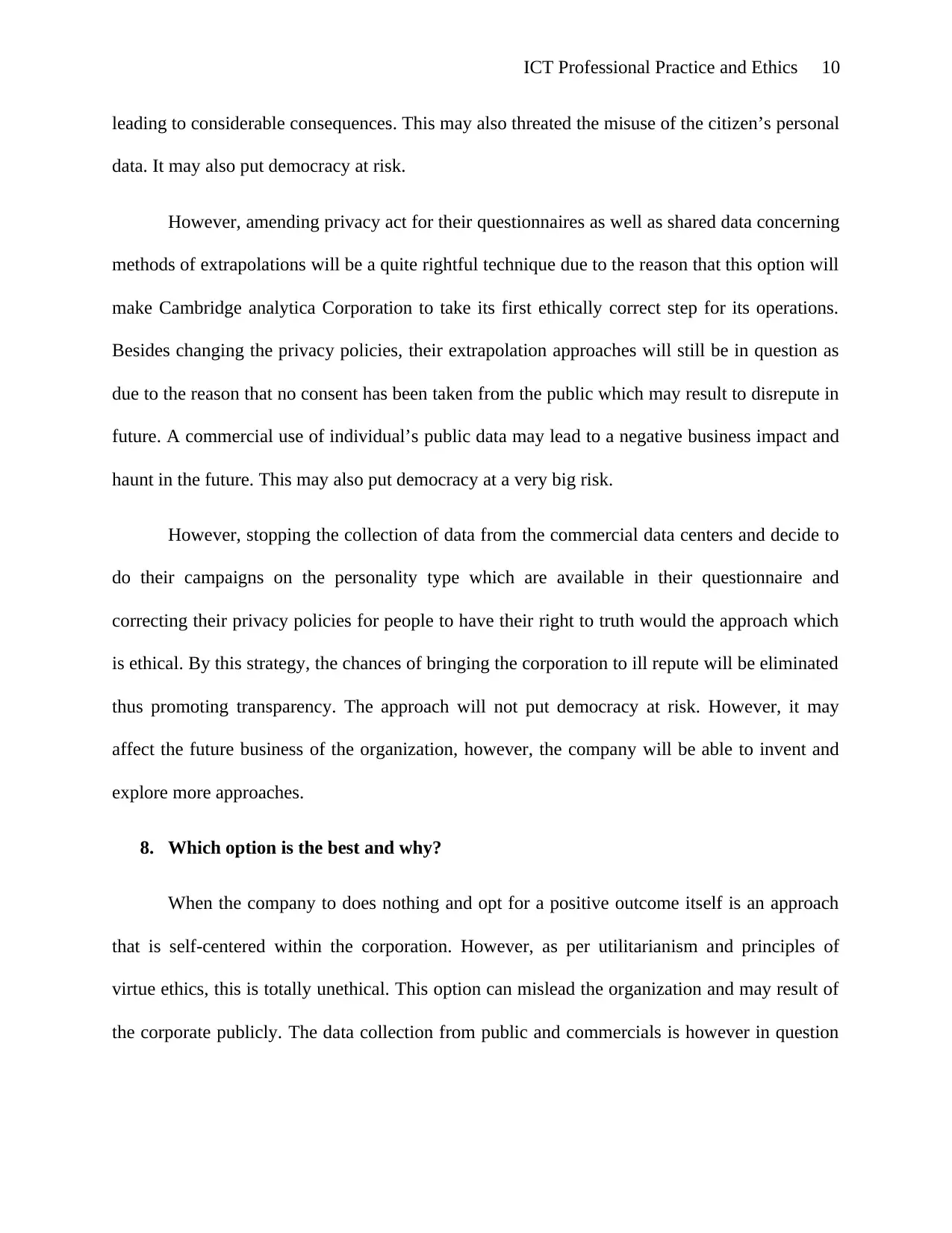
ICT Professional Practice and Ethics 10
leading to considerable consequences. This may also threated the misuse of the citizen’s personal
data. It may also put democracy at risk.
However, amending privacy act for their questionnaires as well as shared data concerning
methods of extrapolations will be a quite rightful technique due to the reason that this option will
make Cambridge analytica Corporation to take its first ethically correct step for its operations.
Besides changing the privacy policies, their extrapolation approaches will still be in question as
due to the reason that no consent has been taken from the public which may result to disrepute in
future. A commercial use of individual’s public data may lead to a negative business impact and
haunt in the future. This may also put democracy at a very big risk.
However, stopping the collection of data from the commercial data centers and decide to
do their campaigns on the personality type which are available in their questionnaire and
correcting their privacy policies for people to have their right to truth would the approach which
is ethical. By this strategy, the chances of bringing the corporation to ill repute will be eliminated
thus promoting transparency. The approach will not put democracy at risk. However, it may
affect the future business of the organization, however, the company will be able to invent and
explore more approaches.
8. Which option is the best and why?
When the company to does nothing and opt for a positive outcome itself is an approach
that is self-centered within the corporation. However, as per utilitarianism and principles of
virtue ethics, this is totally unethical. This option can mislead the organization and may result of
the corporate publicly. The data collection from public and commercials is however in question
leading to considerable consequences. This may also threated the misuse of the citizen’s personal
data. It may also put democracy at risk.
However, amending privacy act for their questionnaires as well as shared data concerning
methods of extrapolations will be a quite rightful technique due to the reason that this option will
make Cambridge analytica Corporation to take its first ethically correct step for its operations.
Besides changing the privacy policies, their extrapolation approaches will still be in question as
due to the reason that no consent has been taken from the public which may result to disrepute in
future. A commercial use of individual’s public data may lead to a negative business impact and
haunt in the future. This may also put democracy at a very big risk.
However, stopping the collection of data from the commercial data centers and decide to
do their campaigns on the personality type which are available in their questionnaire and
correcting their privacy policies for people to have their right to truth would the approach which
is ethical. By this strategy, the chances of bringing the corporation to ill repute will be eliminated
thus promoting transparency. The approach will not put democracy at risk. However, it may
affect the future business of the organization, however, the company will be able to invent and
explore more approaches.
8. Which option is the best and why?
When the company to does nothing and opt for a positive outcome itself is an approach
that is self-centered within the corporation. However, as per utilitarianism and principles of
virtue ethics, this is totally unethical. This option can mislead the organization and may result of
the corporate publicly. The data collection from public and commercials is however in question
Paraphrase This Document
Need a fresh take? Get an instant paraphrase of this document with our AI Paraphraser
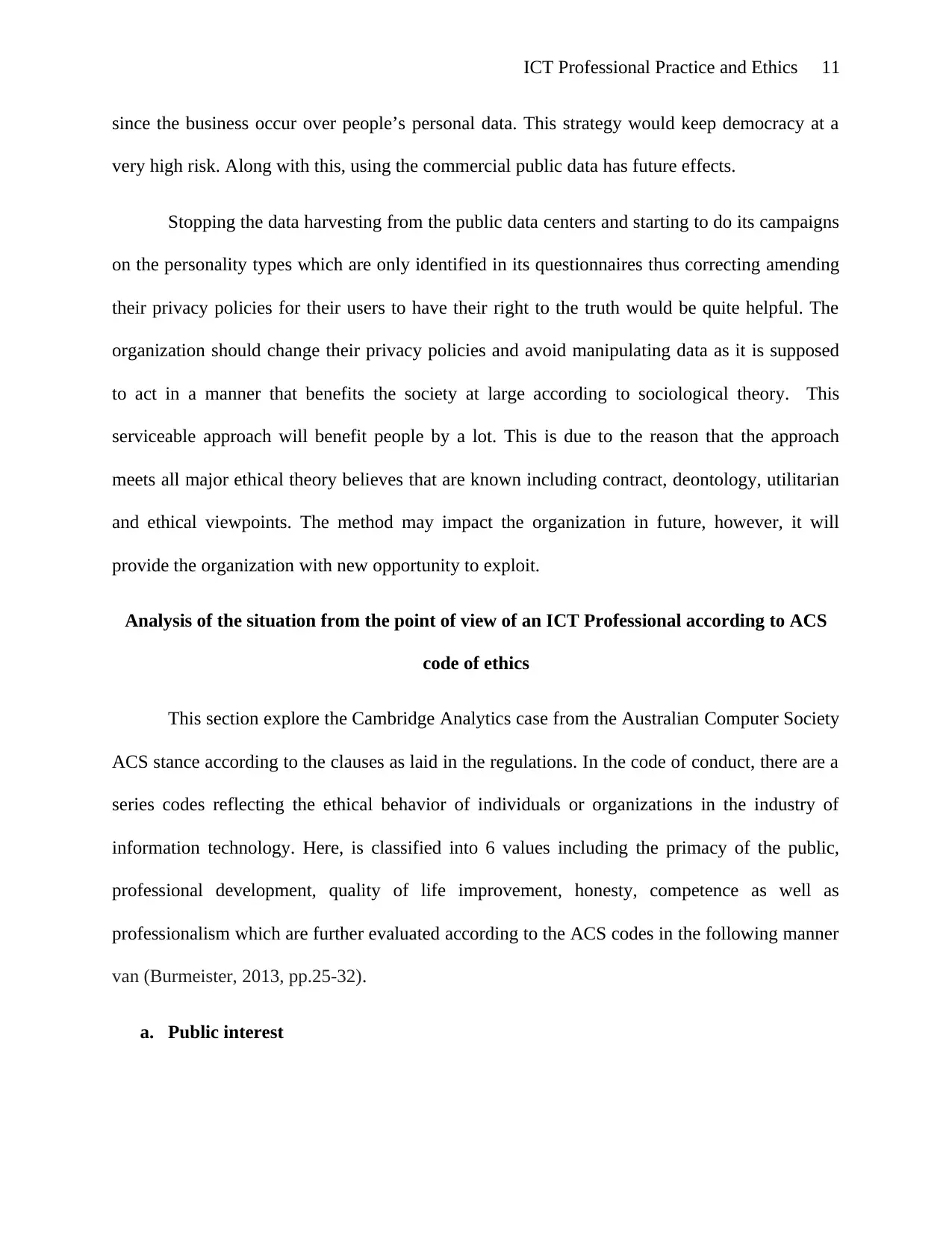
ICT Professional Practice and Ethics 11
since the business occur over people’s personal data. This strategy would keep democracy at a
very high risk. Along with this, using the commercial public data has future effects.
Stopping the data harvesting from the public data centers and starting to do its campaigns
on the personality types which are only identified in its questionnaires thus correcting amending
their privacy policies for their users to have their right to the truth would be quite helpful. The
organization should change their privacy policies and avoid manipulating data as it is supposed
to act in a manner that benefits the society at large according to sociological theory. This
serviceable approach will benefit people by a lot. This is due to the reason that the approach
meets all major ethical theory believes that are known including contract, deontology, utilitarian
and ethical viewpoints. The method may impact the organization in future, however, it will
provide the organization with new opportunity to exploit.
Analysis of the situation from the point of view of an ICT Professional according to ACS
code of ethics
This section explore the Cambridge Analytics case from the Australian Computer Society
ACS stance according to the clauses as laid in the regulations. In the code of conduct, there are a
series codes reflecting the ethical behavior of individuals or organizations in the industry of
information technology. Here, is classified into 6 values including the primacy of the public,
professional development, quality of life improvement, honesty, competence as well as
professionalism which are further evaluated according to the ACS codes in the following manner
van (Burmeister, 2013, pp.25-32).
a. Public interest
since the business occur over people’s personal data. This strategy would keep democracy at a
very high risk. Along with this, using the commercial public data has future effects.
Stopping the data harvesting from the public data centers and starting to do its campaigns
on the personality types which are only identified in its questionnaires thus correcting amending
their privacy policies for their users to have their right to the truth would be quite helpful. The
organization should change their privacy policies and avoid manipulating data as it is supposed
to act in a manner that benefits the society at large according to sociological theory. This
serviceable approach will benefit people by a lot. This is due to the reason that the approach
meets all major ethical theory believes that are known including contract, deontology, utilitarian
and ethical viewpoints. The method may impact the organization in future, however, it will
provide the organization with new opportunity to exploit.
Analysis of the situation from the point of view of an ICT Professional according to ACS
code of ethics
This section explore the Cambridge Analytics case from the Australian Computer Society
ACS stance according to the clauses as laid in the regulations. In the code of conduct, there are a
series codes reflecting the ethical behavior of individuals or organizations in the industry of
information technology. Here, is classified into 6 values including the primacy of the public,
professional development, quality of life improvement, honesty, competence as well as
professionalism which are further evaluated according to the ACS codes in the following manner
van (Burmeister, 2013, pp.25-32).
a. Public interest
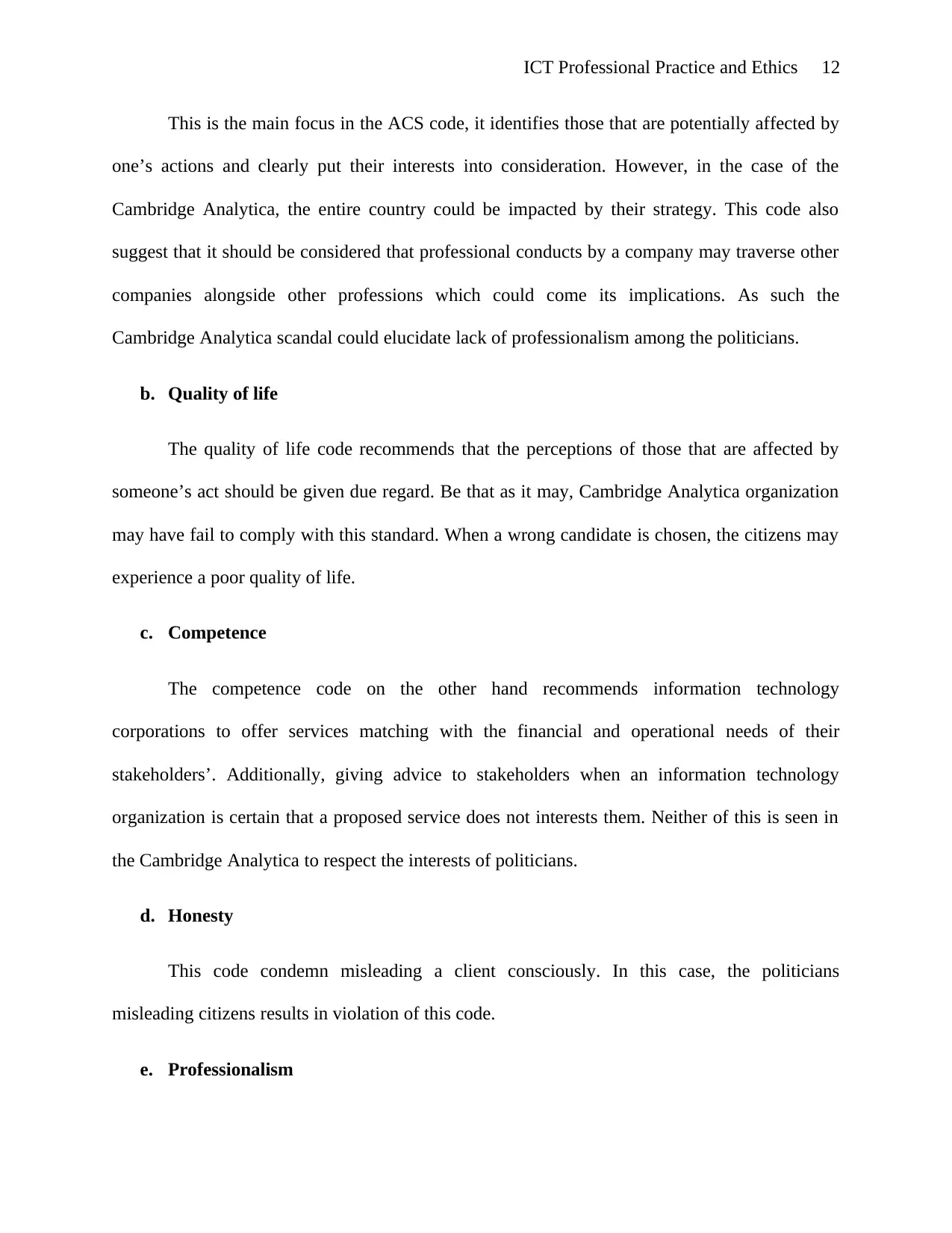
ICT Professional Practice and Ethics 12
This is the main focus in the ACS code, it identifies those that are potentially affected by
one’s actions and clearly put their interests into consideration. However, in the case of the
Cambridge Analytica, the entire country could be impacted by their strategy. This code also
suggest that it should be considered that professional conducts by a company may traverse other
companies alongside other professions which could come its implications. As such the
Cambridge Analytica scandal could elucidate lack of professionalism among the politicians.
b. Quality of life
The quality of life code recommends that the perceptions of those that are affected by
someone’s act should be given due regard. Be that as it may, Cambridge Analytica organization
may have fail to comply with this standard. When a wrong candidate is chosen, the citizens may
experience a poor quality of life.
c. Competence
The competence code on the other hand recommends information technology
corporations to offer services matching with the financial and operational needs of their
stakeholders’. Additionally, giving advice to stakeholders when an information technology
organization is certain that a proposed service does not interests them. Neither of this is seen in
the Cambridge Analytica to respect the interests of politicians.
d. Honesty
This code condemn misleading a client consciously. In this case, the politicians
misleading citizens results in violation of this code.
e. Professionalism
This is the main focus in the ACS code, it identifies those that are potentially affected by
one’s actions and clearly put their interests into consideration. However, in the case of the
Cambridge Analytica, the entire country could be impacted by their strategy. This code also
suggest that it should be considered that professional conducts by a company may traverse other
companies alongside other professions which could come its implications. As such the
Cambridge Analytica scandal could elucidate lack of professionalism among the politicians.
b. Quality of life
The quality of life code recommends that the perceptions of those that are affected by
someone’s act should be given due regard. Be that as it may, Cambridge Analytica organization
may have fail to comply with this standard. When a wrong candidate is chosen, the citizens may
experience a poor quality of life.
c. Competence
The competence code on the other hand recommends information technology
corporations to offer services matching with the financial and operational needs of their
stakeholders’. Additionally, giving advice to stakeholders when an information technology
organization is certain that a proposed service does not interests them. Neither of this is seen in
the Cambridge Analytica to respect the interests of politicians.
d. Honesty
This code condemn misleading a client consciously. In this case, the politicians
misleading citizens results in violation of this code.
e. Professionalism
⊘ This is a preview!⊘
Do you want full access?
Subscribe today to unlock all pages.

Trusted by 1+ million students worldwide
1 out of 14
Related Documents
Your All-in-One AI-Powered Toolkit for Academic Success.
+13062052269
info@desklib.com
Available 24*7 on WhatsApp / Email
![[object Object]](/_next/static/media/star-bottom.7253800d.svg)
Unlock your academic potential
Copyright © 2020–2026 A2Z Services. All Rights Reserved. Developed and managed by ZUCOL.





